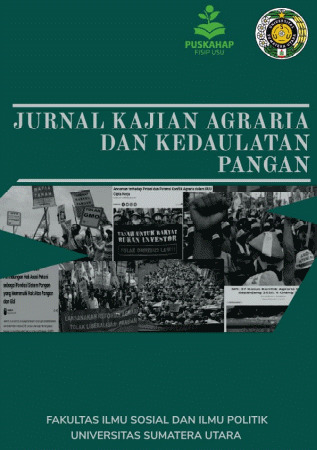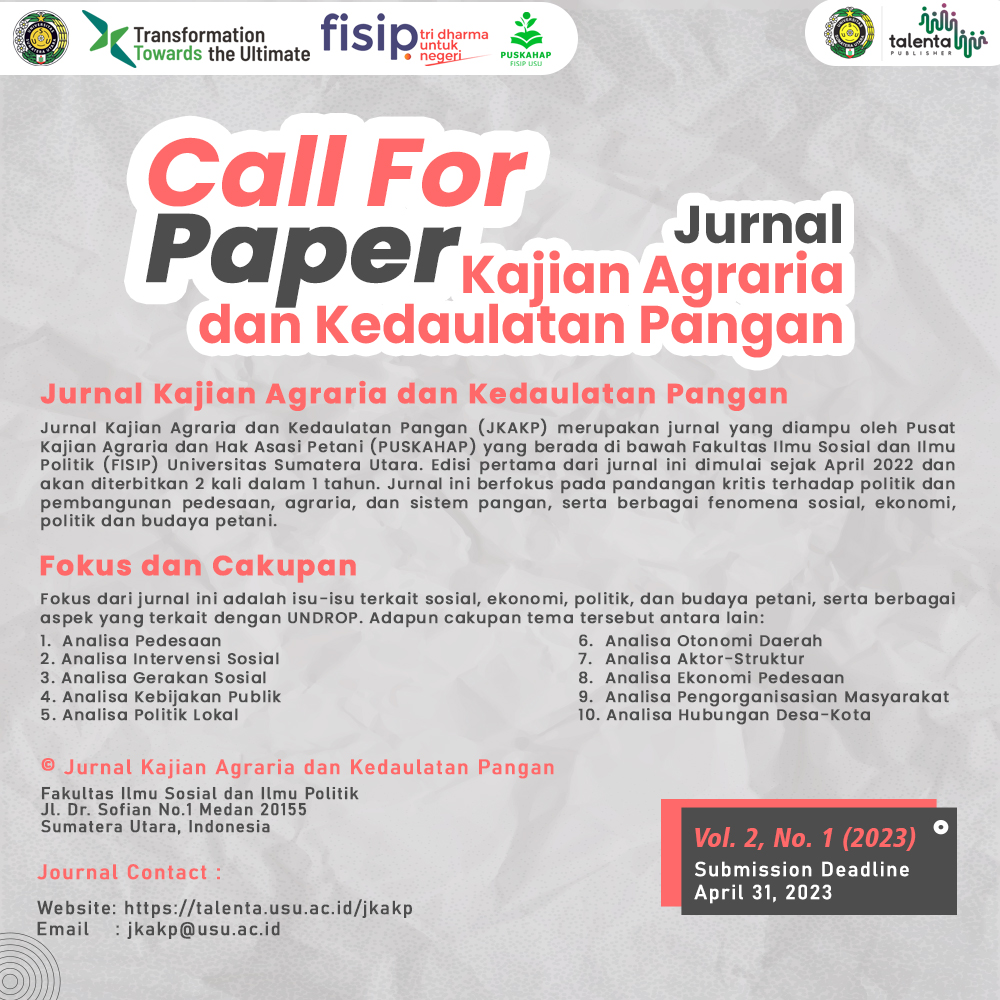Analisis Teori Legitimasi Pada Konflik Rekognisi Penguasaan Tanah Adat antara PT Asam Jawa dengan Komunitas Terdampak
DOI:
https://doi.org/10.32734/jkakp.v2i1.13262Keywords:
legitimacy gap, land and tenure conflicts, legitimation theoryAbstract
Agrarian conflicts in the plantation sector are dominated by oil palm plantation conflicts. This article discusses the conflict over recognition of customary land tenure that occurred in Torgamba District involving PT Asam Jawa and affected communities. The theory used to analyze the conflict of recognition of customary land tenure is the theory of legitimacy. The method used is the study of literature and literature. Data collection techniques are carried out through scientific journals and other literature sources related to studies and research problems. The results showed that there was a legitimacy gap that occurred between PT Asam Jawa and the affected communities. The legitimacy gap is caused by PT Asam Jawa's failure to meet the needs and expectations of the community and comply with norms, values, and boundaries recognized by local residents.
References
Daniri, M. A. (2007). Good Corporate Governance : Konsep dan Penerapannya dalam Konteks Indonesia. Jakarta: Ray Indonesia.
Deegan, C. (2004). Financial Accounting Theory. McGraw-Hill Book Company.
Emalia, D., & Shauki, E. R. (2023). Analisis Krisis Legitimasi dan Pembangunan Berkelanjutan PT Pelindo Bengkulu akibat Konflik Lahan dengan Masyarakat. Owner: Riset & Jurnal Akuntansi 7(2), 1612-1623.
Gray, R., Kouhy, R., & Lavers, S. (1996). Methodological themes Constructing a research database of social and environmental reporting by UK companies.
Harahap, R. H., Afrizal, & Azwar. (2019). Tanggung Jawab Sosial PT Asam Jawa kepada Komunitas Terdampak sebagai Strategi Pengelolaan Konflik Sosial. Sodality: Jurnal Sosiologi Pedesaan 7(3), 263-274.
Lindawati, A. S., & Puspita, M. E. (2015). CORPORATE SOCIAL RESPONSIBILITY: IMPLIKASI STAKEHOLDER DAN LEGITIMACY GAP DALAM PENINGKATAN KINERJA PERUSAHAAN. Jurnal Akuntansi Multiparadigma 6(1), 157-147.
O'Donovan, G. (2002). Environmental disclosures in the annual report: Extending the applicability and predictive power of legitimacy theory. Accounting, Auditing and Accountability Journal 15 (3) , 344–371.
Pratama, I. S., & Deviyanti, D. R. (2022). Pengaruh pengungkapan corporate social responsibility terhadap institutional ownership pada perusahaan high-profile yang listing di bursa efek Indonesia. INOVASI: Jurnal Ekonomi, Keuangan dan Manajemen 18(3), 540-550.
Rahman, R. (2017). KONFLIK MASYARAKAT DENGAN PEMERINTAH (STUDI KASUS SENGKETA TANAH ADAT). Sosioreligius 3(1), 41-48.
Suryadi, Dharmawan, A. H., & Barus, B. (2020). Ekspansi dan Konflik pada Perkebunan Kelapa Sawit:Kasus di Desa Terantang Manuk, Kabupaten Pelalawan, Riau. Sodality: Jurnal Sosiologi Pedesaan 8 (03), 167-178.
Downloads
Published
Issue
Section
License
Copyright (c) 2023 Jurnal Kajian Agraria dan Kedaulatan Pangan (JKAKP)

This work is licensed under a Creative Commons Attribution-ShareAlike 4.0 International License.







